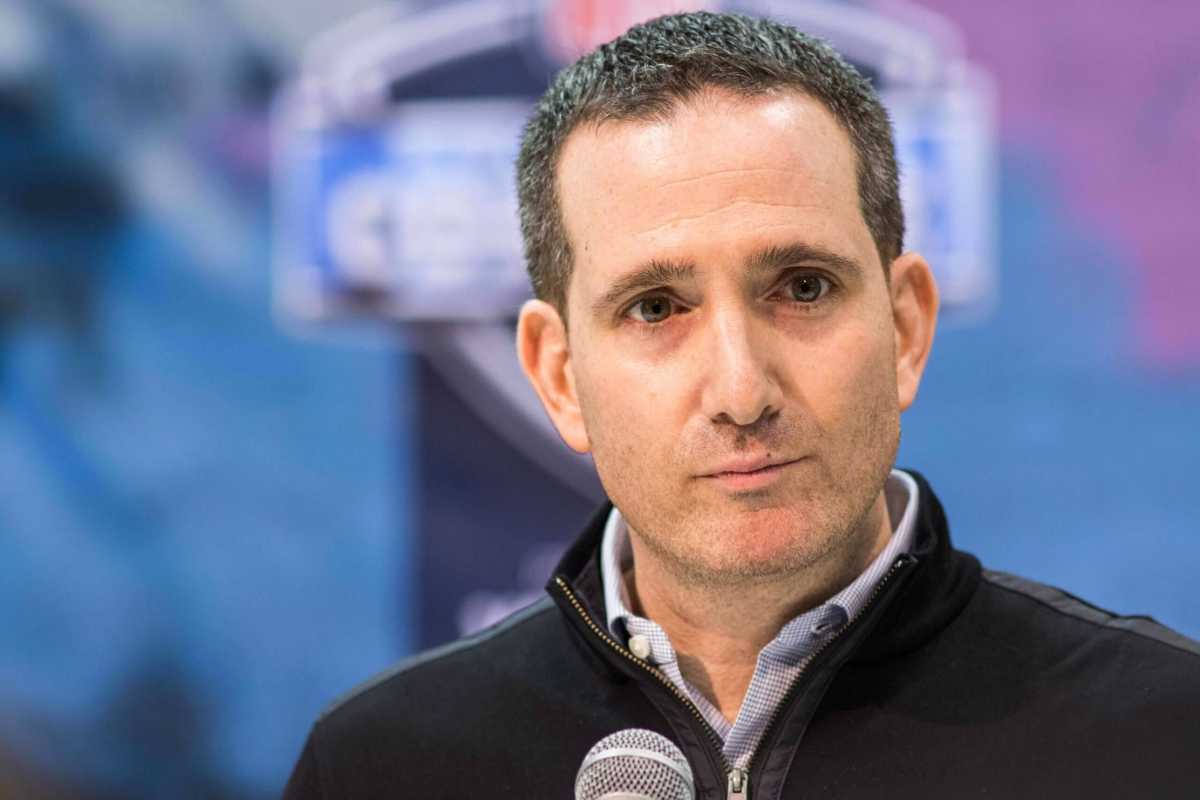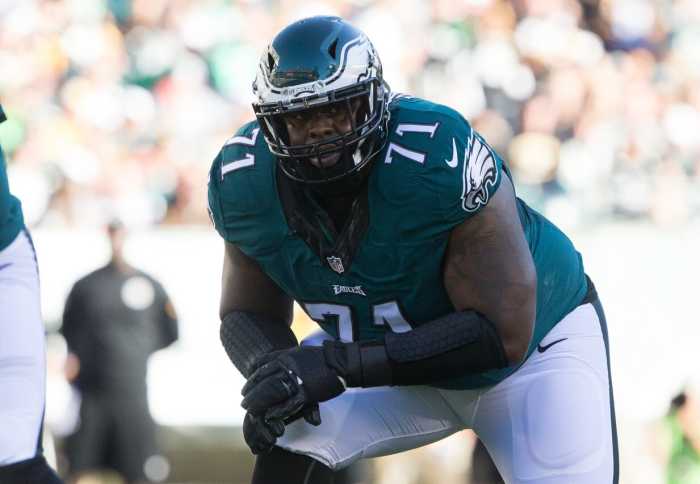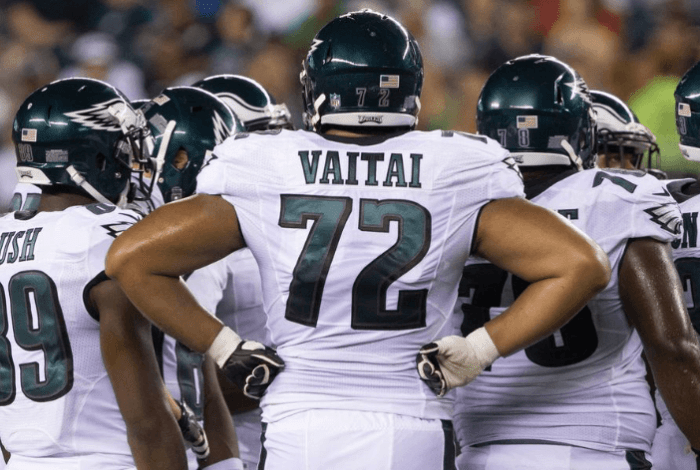For the last three offseasons, fans have asked themselves the same questions. The first will be something along the lines of ‘How on earth are the Eagles going to sign player X when they have no cap space?’. The second, asked a few weeks later will sound something like ‘How does Roseman do it?!’. The Eagles GM is somehow able to defy the odds year upon year, yet no other team appear to be able to do the same. But why?
If we look at how Roseman approaches this struggle every year, each re-worked deal follows a pattern.
1: Find your cornerstone player and keep them in Philadelphia for as long as possible
This is probably the most important part. Lane Johnson, Jason Kelce, Zach Ertz, Malcolm Jenkins, Nigel Bradham, Fletcher Cox, Brandon Brooks, and Alshon Jeffery are just some of the names who have been circled in red and given big-time extensions by the Eagles in the last few years. By building from the ball outward, Roseman has established a very firm foundation to build the rest of his team around. The contracts will often start with a generous signing bonus while the base salary increases over time.
2: Be aware of the backloading…
Because every deal follows the same trait, what we often see is that the Eagles will end up swimming even more desperately against the salary cap tide with each season that passes. The deals are all structured with longevity in mind, giving players more money each season they spend with the team. This gives the Eagles some immediate cap relief to make more moves, before ultimately encountering windows like the one Roseman is currently working through.
3: The fun begins…
Let’s take Lane Johnson’s deal for example. Field Yates released some very interesting information today with regards to the recent restructure:
The deal hasn’t been restructured in a way that Johnson loses money, but in a sense that you’re kind of finding new ways to pay off that old Credit Card, perhaps by shifting the balance onto a new one with 0% interest for a few months before doing the same again when that period runs out.
Originally, Johnson signed a 5 year, $56,260,000 deal with the Eagles, including a $10,000,000 signing bonus and $35,500,000 guaranteed. The Eagles restructured said extension after Johnson’s suspension, revoking the guaranteed money to buy them some flexibility…but this most recent one gets even more interesting.
Set to be a free agent in 2022, the Eagles have added two ‘dummy years’ to Johnson’s contract during the restructure, giving them an extra window to move that money around. If we look at Johnson’s cap hit this season, it’s $7.2M. Next season, that number doubles, with his base salary going from what is now $800,000 to $8M.
Roseman took Johnson’s base salary and reduced it to the league minimum, making the rest a bonus that will be paid over the duration of his contract…or by a certain owner who has cashflow to inject. And this is where things become fun.
As of right now, the Eagles are $21M UNDER the salary cap…which is a staggering statistic considering they were over the cap by a considerable margin just weeks before free agency.
Next up, let’s take a look at Kelce’s recent extension. That move alone creates $4M of cap space for the Eagles and was conducted in a similar fashion.
What Howie Roseman does is essentially sign a key player to a long-term deal with a huge signing bonus in order to lower the base salary. As that base salary then increases in conjunction with other moves and production, Roseman opens a restructure that will either add ‘dummy years’ to help spread the cost of said deal, or turn the majority of that salary into a bonus that can be paid over the remainder of the deal.
4: So….why does nobody else do this?
The simple answer is that much like that credit card, you still have a balance to pay. Roseman isn’t magically making that money disappear, as much he is generating leverage. The closer a player gets to free agency, the more leverage the player will have. It’s a player friendly concept that will maximize the benefit for Philadelphia. If the player thinks he can get more elsewhere or wishes to test free agency, the Eagles have taken what could’ve once been a monumental cap hit and spread it out over a five-year duration in which that cornerstone player has performed at an elite level. The player will then either remain in Philly (Brandon Graham) or seek solace elsewhere to secure that up-front cash.
Teams don’t like doing this because you can’t pass the buck forever and eventually, all of those back-loaded contracts, like a shaken up can of soda are going to blow up. The gamble that Roseman is taking is that by the time that happens, the Eagles have eventual replacements in the pipeline having built through the draft, or have generated enough cap space by consistently executing these sorts of moves to then restart the process all over again.
NFL owners don’t like losing leverage and ultimately, this ‘player-first’ mentality will reduce what leverage the Eagles brass has over time…unless the winning culture persists and players earn all of their bonuses, which is exactly what’s happening.
It’s also handy that Jeffery Lurie is one of the most passionate owners in the league and is willing to help his team out in these situations. Bonuses have to be paid in a set time-frame and not every team has a spare $10M lying around. That kind of flexibility, that sense of being one cohesive unit and having an owner so invested in the team is a real blessing for a team battling the books to find as many loopholes as possible to sustain a window where they have elite talents across the board, for as long as possible.
What Howie Roseman is doing isn’t mythical. It isn’t magical. It’s incredibly smart and is a true testament to why he’s become one of the youngest, most successful GM’s in the league. It’s a fresh way of thinking and an attention to detail that will see him capitalize on the smallest of tremors…just like Lane Johnson’s suspension that saw a huge deal turn into a team-friendly apology until this past week.
It’s surgical, methodical and down-right mesmerizing. It’s playing gutsier than most general managers would like to and in a league where going against the grain is by any mean’s safe, sometimes flying far from home can reap the ultimate reward.





























